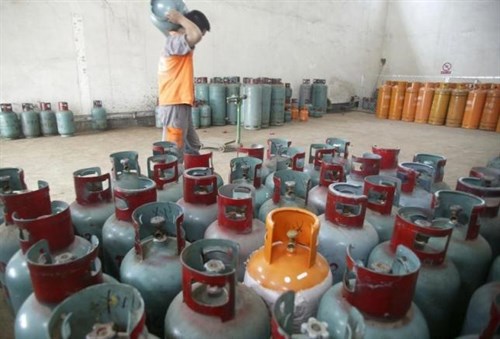Traders lose millions as LPG glut shocks market

A worker carries a cylinder of Liquefied Petroleum Gas (LPG) in Foshan, Guangdong province, October 20, 2008. Photo courtesy of Reuters.
(Reuters) Traders in the LPG market face a glut that has led to millions of dollars in losses as Chinese buyers are in a stand off with oil companies to cancel deals.
LPG, a historically niche and dislocated market, has ballooned with the advent of US exports due to the shale boom. The US went from an importer to the largest single exporter of propane in just a few years, rivaling the Middle East Gulf producers.
"I can't remember it being this bad. There was massive new production out of the US and people hoped the Chinese market might absorb it," one LPG trader said.
"There was strong buying in the first four months of the year with low oil prices but that stopped and the market is now a few million tons long."
A glut was expected, but its severity caught most by surprise and will likely serve as a warning to those trading LNG, which is increasingly oversupplied.
LPG is the collective term for propane and butane. The US exports mostly propane used for heating and in the petrochemical industry to make propylene, a base for plastics manufacturing.
Traders have been left scrambling to mitigate losses as China has failed to be the driver of demand.
At least five companies — Vitol, Gunvor, Shell, BP and EDF Trading — canceled July-loading cargoes out of the two major Texas LPG terminals, preferring to pay penalties of up to $1 million per cargo.
Many LPG traders signed up for multi-year contracts but premiums to the US benchmark on a spot basis sunk by about $40 a ton this year, undercutting the term lifters.
The contracts were also signed when the US benchmark was around a $150 to $200-per-ton discount to the European benchmark and Saudi Arabia's official selling price. But spreads shrunk dramatically in 2016, making US exports suddenly unappealing to Asia.
Chinese end-users are now cancelling or renegotiation their term contracts, taking advantage of product overhangs in the Middle East and a cheaper alternative feedstock, naphtha.
Asian demand slowed earlier this year on weak propylene margins, which led to run cuts and delayed new plant start-ups. After hitting a trough, the market is expected to rebalance by the year-end though supply will continue to outpace demand.
"Non-associated gas output means there will be a steady rise in NGL output despite the oil price doldrums. This trend will continue in the medium term," Al Troner, head of Asia Pacific Energy Consulting in Houston, said.
SHOWDOWN IN COURT
The disputes have in some cases devolved into open altercations and tanker stand-offs.
At an LPG conference earlier this year in China, one trader said he saw "serious arguments between the Chinese and the US suppliers outside the hall at the café ... Everyone pretended not to be eavesdropping but stopped chatting and just stood still".
Targa Resources, operator of an export terminal in Texas, has been stung by contracts with Chinese buyers and is seeking "damages in excess of $1 M" from China Soft Packaging Group, documents filed by Targa at a Texas county court showed.
"The US suppliers already made fat margins earlier (in 2015) and they should be ready for price negotiations," a senior source with one of the east China-based LPG buyers said.
Hong Kong-based Oriental Energy International Trading has also had disputes with Targa and Greek LPG trader Naftomar. Targa let Oriental's Kikyo tanker languish for weeks offshore Texas in June. Naftomar's Constellation ship is now stuck outside China's Ningbo port, a senior trader at Naftomar said.
Singapore-based SK Chemical Trading recently canceled contracts with Naftomar, Petredec and Shell after its end-user Zhejiang Shaoxing Sanyuan Petrochemical Co. reneged on its orders. The companies did not respond to requests for comment.
One trader said the price rout was ruining careers and had "gunfight at the O.K. Corral-type implications", referring to one of the most famous shootouts from the days of the American Wild West.
Reporting by Julia Payne and Chen Aizhu; Additional reporting by Libby George, Florence Tan and Seng Li Peng and Liz Hampton; Writing by Julia Payne; Editing by Dale Hudson

- Freeport LNG export plant in Texas reports shutdown of liquefaction train
- TotalEnergies and Mozambique announce the full restart of the $20-B Mozambique LNG project
- RWE strengthens partnerships with ADNOC and Masdar to enhance energy security in Germany and Europe
- Five energy market trends to track in 2026, the year of the glut
- Venture Global wins LNG arbitration case brought by Spain's Repsol



Comments